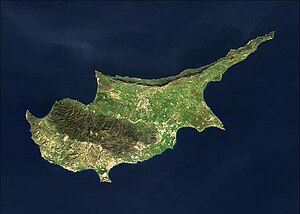| MODIS satellite image of Cyprus. (Photo credit: Wikipedia) |
Building on its new role as the Eastern Mediterranean’s natural gas anchor, Cyprus announced a new working partnership with Egypt meant to promote the sharing of expertise and experience between the two countries. According to comments from Egyptian Minister of Petroleum and Mineral Resources, Ossama Kamal, Cyprus made an appeal for guidance on how best to approachthe island-nation’s new-found oil and gas claims in the region. A Cypriot technical delegation is scheduled to travel to Egypt next month, according to the Egypt Daily News.
Recently, Cyprus has emerged as one of the most active actors in the push to exploit the Eastern Mediterranean’s newfound energy potential. The country’s European backing and apparent willingness to explore production partnerships with just about anyone have allowed them to etch out a reliable middle ground in the often-contentious energy environment. As Israel, Lebanon and Turkey deal with conflicting claims over the regional find and maritime, Cyprus appears content to extend an olive branch to all in the region.
To be sure, leaders in Nicosia have encountered some blowback for their efforts, most notably in the form of Turkish naval ships sent to express the country’s strong feelings about Northern Cyprus being left out of the energy boom. But even then, Cyprus responded with an open-arms approach, suggesting that gas revenues from local exploration could be used to fund reunification talks between the island’s two halves.
For their part, Egypt may view this new partnership with Nicosia as a potential path into a regional energy boom they’ve been locked out of until now – the Levant Basin.
Situated in waters between Israel, Lebanon, Syria and Cyprus, the Levant Basin boasted an estimated 122 trillion cubic feet of natural gas, offering a path to energy independence for much of the region. However, located at deep and precarious depths, the gas remains a costly investment. Only Cyprus and Israel have made real progress towards exploiting the reserves and even now, the cost of securing operations in such a highly contentious environment could prove challenging for Tel Aviv. Turkey has announced plans to begin exploration efforts of the coast of North Cyprus, but progress remains uncertain.
This environment has left Cyprus as the willing middleman between the region’s many interested parties.
“The strategic position of Cyprus in the Mediterranean Sea, in conjunction with the recent gas discoveries in the region and plans for their export, could prove an alternative and fully flexible gas storage hub for the European Union and the rest of the world”, Industry and Tourism Neoklis Sylikiotis recently said during a speech to the European Oil & Gas Summit, according to a government release.
In addition to the new agreement with Egypt, Cyprus has established ties with Israel, including exploring the possibility of hosting refining, transport and Liquefied Natural Gas facilities that the Israeli government would rather not have around.
For its own part, the Levant offers Cyprus access to an estimated 5.1 trillion cubic feet of natural gas within the country’s Exclusive Economic Zone. According to Reuters, the country’s Industry and Tourism minister Neoclis Sylikiotis suggested they would be able to meet domestic needs with local natural gas by 2017 and earn export revenue by 2019. Having reported the natural gas find just this past December, Cyprus moved quickly to exploit the claim by asking for bids in May. The response from foreign firms, including Total and Italy’s Eni, amounted to 15 bids across 9 blocks. Russian firms also chimed in with support, reflecting urgency on the part of the country to support Cyprus through its current economic crisis. According to Bloomberg, Russians make up a large percentage of the non-residents in Cyprus who hold one of every two euros deposited in the country’s banks.
To be clear, any new energy role the island nation could take on is unlikely to help them out of their immediate fiscal ditch. Facing a enormous deficits and losses thanks to their exposure to Greek sovereign debt, Cyprus will most certainly need more than the $12.4 billion its creditors and potential lenders now believe they need. That’s going to take a while and by no means will it be pleasant.
While Cyprus’ open-armed approach has worked so far, their new partnership with Egypt could prove difficult to sustain alongside their cooperation with Israel, especially if Cairo expands their current offshore efforts towards already contested waters. In the months since the collapse of the government of Hosni Mubarak, ties between Egypt and Israel have been increasingly strained, due mostly to natural gas agreements. After Mubarak was removed from power, records emerged showing below market prices for a 20-year gas agreement with Israel and allegations of further corruption with the ousted president’s administration. This tension was accompanied by 15 attacks on pipelines from Egyptian fields to Israel, who looked west for 35 to 40 percent of their natural gas needs. The situation continued to sour until gas sales to Israel were finally cancelled.
http://www.forbes.com/sites/christophercoats/2012/10/24/cyprus-extends-east-med-gas-role-with-egyptian-deal/
http://geopolitics-gr.blogspot.gr/2012/10/cyprus-extends-east-med-gas-role-with.html





